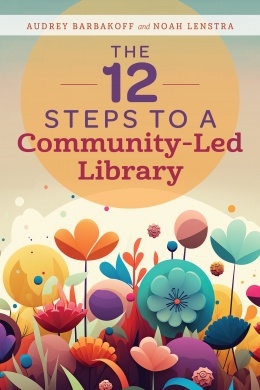Primary tabs
You don't need to be an ALA Member to purchase from the ALA Store, but you'll be asked to create an online account/profile during checkout to proceed. This Web Account is for both Members and non-Members. Note that your ALA Member discount will be applied at the final step of the checkout process.
If you are Tax-Exempt, please verify that your account is currently set up as exempt before placing your order, as our new fulfillment center will need current documentation. Learn how to verify here.
- Description
- Table of Contents
- About the authors
- Reviews
Listen to a podcast with the authors now!
This down-to-earth guide introduces readers to community-led planning, a method for putting equity and inclusion values into practice through programs, services, spaces, and decisions that center and empower communities.
Libraries want to be more responsive to their diverse communities. Yet many libraries lack the structures, cultures, and mindsets to sustain community-led methods. This book lays out an evidence-based, twelve-step process that will help you transform your library in ways that serve your unique community effectively. Whether you’re an administrator, middle manager, or front-line library worker, the concrete strategies presented here will show you how to integrate community-led planning into your day-to-day activities. Anchored in original research by its authors and bolstered by real-world examples, this book
- introduces the foundations of community-led planning, including what it means, why it matters, and how to do it well;
- takes you through a twelve-step process, adaptable to libraries of any size or budget and serving any type of community, to fundamentally shift your organization towards more equitable and community-centered ways of thinking;
- presents strategies for success, pitfalls to avoid, lessons from case studies, and key takeaways for each step; and
- offers tools to assess your organization’s capacity, evaluate your progress, adapt, and troubleshoot.
Examination copies are available for instructors who are interested in adopting this title for course use.
Introduction: The Community Is the Heart of the Library
Part I: Foundations
Chapter 1: Community-Led Planning 101: What it Means and Why it Matters
Chapter 2: Relationship to Equity, Diversity, Inclusion, and Social Justice
Chapter 3: How to Conduct Community-Led Planning
Chapter 4: Assessing your Library’s Community-Led Capacity
Chapter 5: The Community-Led Capacity-Building (CoLaB) Model
Part II: Phase One: Inspirational Change
Step 1: Set Clear Expectations
Step 2: Train for Understanding, Not Procedure
Step 3: Connect to Core Values
Part III: Phase Two: Transformational Change
Step 4: Foster a Growth Mindset
Step 5: Develop Psychological Safety for a Culture of Inclusive Innovation
Step 6: Make Time and Space for Reflection
Step 7: Prioritize Interpersonal Skills and Cultural Humility
Step 8: Apply Prior Knowledge
Step 9: Build Community Knowledge through Relationships
Part IV: Phase Three: Operational Change
Step 10: Give Staff Time and Authority to Build Relationships
Step 11: Make It Everyone’s Work
Step 12: Measure Success through Relationships
Part V: Evaluating, Adapting, and Troubleshooting
Conclusion: Moving Forward and Coming Back
Index
Audrey Barbakoff
Audrey Barbakoff is the CEO of Co/lab Capacity LLC, which provides community-centered consulting for libraries and social good organizations. During more than a decade in public libraries, her work was recognized by Library Journal Movers & Shakers, the Urban Libraries Council Top Innovators, and the Freedom to Read Foundation. Dr. Barbakoff holds an MLIS from the University of Washington and an EdD in Organizational Change and Leadership from the University of Southern California. She is co-author of The 12 Steps to a Community-Led Library, and author of Adults Just Wanna Have Fun: Programs for Emerging Adults and the forthcoming picture book The Schlemiel Kids Save the Moon.
Noah Lenstra
Noah Lenstra is an associate professor of library and information science at the University of North Carolina at Greensboro, where he brings a community organizing approach to the teaching and research of public librarianship. Since 2016, Dr. Lenstra has managed the Let’s Move in Libraries initiative, an online space for sharing stories and resources related to public library participation in community health initiatives related to food or physical activity. Dr. Lenstra holds doctoral and master’s degrees in library and information science from the University of Illinois at Urbana–Champaign.
Have you read this book? Leave a review!
"This guide is both energizing and practical, suggesting actionable, research-based steps for adapting the process to libraries of any size or budget ... A timely, companionable book, highly recommended for any library hoping to move beyond DEI informational sessions and enact demonstrable change."
— Library Journal



